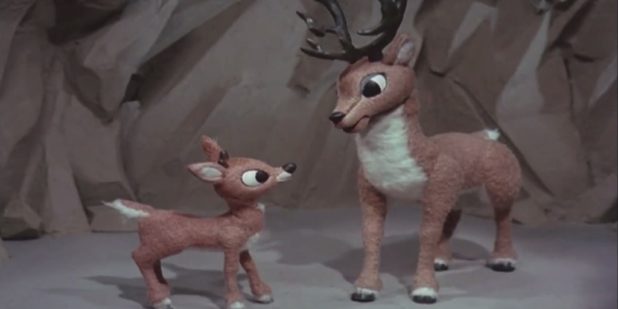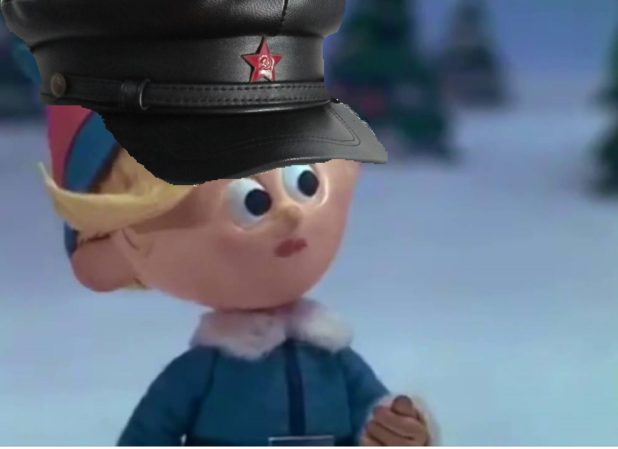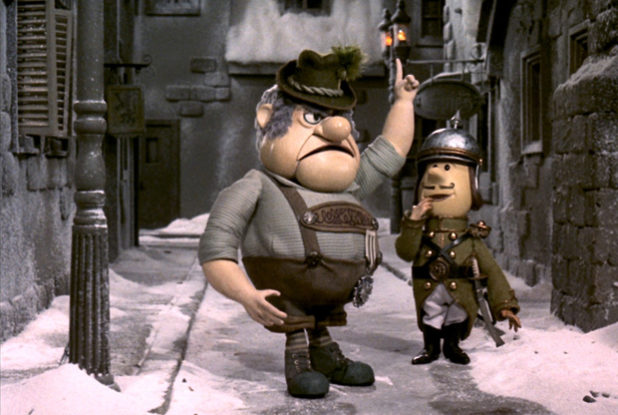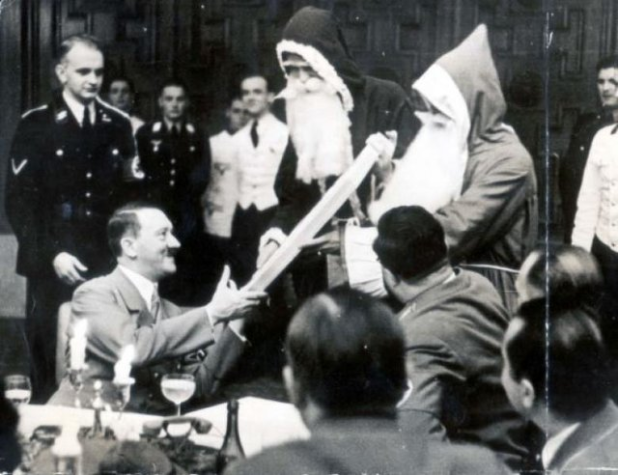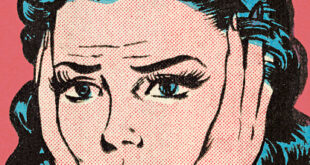Tory Scot
The Right Stuff
December 26, 2016
If you know much about Jews, you’re probably aware that they’re not really big fans of Christmas. During their two thousand year exile in Europe, the one thing they could rely on regardless of if they were in Berlin, or Brussels, or in Paris, or in Prague, or in Vienna, or in London, was a Christian culture being present.
Few things unite (or divide) a people as much as religion. It lays the moral framework that everybody agrees to work within, and the rites and celebrations that come with it help strengthen the social fabric by giving a common experience to everyone – almost everyone, that is.
While few holidays were as dearly celebrated by our ancestors as Christmas, to Jews Christmas was the celebration of a blasphemy among the goyim, an alienating celebration that separated them from society at large. Jewish refusal to take part in Christmas celebrations helped to create resentment between Jew and Gentile.
After the Second World War, Jews in America decided that one of the many things that should be remade was Christmas. In the 1930’s ,40’s and 50’s, Jews in New York City virtually rewrote what Christmas was all about, in order to solidify their position in American society. Christmas was an awkward holiday for them, because they simply didn’t fit into it (Jewish rejection of Christ always gave the holiday anti-Semitic undertones), so they went about remaking it so they would fit in.
This was done primarily by secularizing it. It may surprise you to hear that many of the most popular Christmas songs were written by Jews. I apologize in advance for rendering the reader unable to listen to any of the following songs without wincing: Silver Bells, Santa Baby, Winter Wonderland, Let it Snow, Rockin’ Around the Christmas Tree, and Rudolph the Red-Nosed Reindeer.
That’s right. Rudolph, or should I say, (((Rudolph))) is a Jew. It only gets worse from here. You won’t finish this article with your childhood intact, because the story of that reindeer is one of the most egregious examples of Jews rewriting Christmas.
The popular song was written by the Jewish songwriter (((Johnny Marks))), and it was based off the original story that introduced (((Rudolph))) to America written by (((Robert L. May))) in 1939.
To be clear: May never mentioned in any interview he gave or article he authored that he was born Jewish, that his first wife was Jewish or that his daughter Barbara had two Jewish parents.
Yes, Robert May hid his Jewish background. Still, I think it is fair to say that he drew on his status as a member of an ethnic/religious minority to create Rudolph.
Rudolph is, after all, a tale well within the humanist literary tradition of teaching tolerance. Someone is despised or persecuted for an accident of birth like their race, religion, ethnicity or apparent physical disability, then the absurdity and cruelty of discrimination is thwarted when that person (or in the case of Rudolph, an animal) shows his worth when a kindly soul gives him a chance to shine. Rudolph was ahead of its time as an after school special.
I, therefore, was not that surprised when I learned that Robert May was Jewish (at least by birth). More than once I have thought how funny it was that May made Rudolph’s nose the feature that singled out Rudolph for discrimination. I need hardly point out that Jews are stereotypically depicted as having large noses. This stereotype is a long-standing theme in anti-Semitic jokes.
There is no doubt that May also drew upon his history of childhood bullying in creating Rudolph. While these two strands are certainly not mutually exclusive, I was not able to find out if May was ever bullied specifically for being Jewish.
The song and book were so popular that they eventually spawned their own movie. If you thought that the film version would be less echoey than the book and the song, I have bad news for you. The claymation television special first aired in 1964. Based off of (((May’s))) original story and featuring (((Marks’))) song, the film was narrated by (((Burl Ives))), written by possible Jew (((Romeo Muller))) -pictured below-, directed by (((Larry Roemer))), another uncomfirmed Jew, and produced by Rankin and Bass. There’s some debate about the ancestry of the last two.
The story starts in the North Pole, where the head of Santa’s reindeer team, Donner, is with his wife. Ms. Donner is giving birth. The child is born, but something’s a little amiss – his nose glows (much of the film revolves around a very Jewish concern about being mocked about/identified by a nose). Donner realises that there’s something wrong with this, and that his (((nose))) is going to make it clear to everyone around that he’s different. Donner covers his son’s nose so he’ll fit in. Incidentally, I think Donner sounds a lot like George Lincoln Rockwell.
Now listen here, Rudolph, no son of mine is gonna be a Jew.
(((Rudolph))) the hook-nosed reindeer heads off to play in the Reindeer Games with other young bucks hoping to prove themselves to Santa Claus. Somehow (((Rudolph))) performs well, which is how you can tell this is a fictional story. During the course of playing with a friend, (((Rudolph’s))) false nose falls off and everyone sees the infiltrator hiding among them. A pogrom ensues, the coach says (((Rudolph))) isn’t welcome during the Reindeer Games, and Santa, that magnificient amalgamation of Odin and Saint Nicholas, chastises Donner for trying to sneak a Jew onto his sleigh team. “The last time I let a Jewish reindeer on my team he dropped inciendary bombs instead of presents when we flew over Germany.” Clarice, a girl who likes (((Rudolph))) is forbidden by her father from associating with him. (((Rudolph))) runs away from home.
Meanwhile, there’s trouble at Santa’s workshop. (((Hermey))) is an elf who isn’t content being a simple labourer, down with all the goyim. He’s better than that! He wants to take up the perrenial Jewish occupation of dentistry. His boss pleads with him to assimilate, but (((Hermey))) refuses and flees into the forest to become a partisan.
(((Hermey))) and (((Rudolph))) eventually meet in the forest, and the two quickly bond over their refusal to assimilate to goyische society. They agree to team up and overthrow the tyranny of bourgeois society.
They meet (((Yukon Cornelius))), a prospector obsessed with discovering silver and gold. Oy vey. After an introduction, the prospector helps the two escape the clutches of the Abominable Snowman, a horrible anti-Semitic beast. I guess he’s a Nazi or something. Anyways, the three escape on an ice floe and drift towards the Island of Misfit Toys, an island ruled by King Moonracer. There they find “misfit toys”- toys that have been rejected by wicked goy children. One doll tells the three that she was rejected for having a penis. Another is a lesbian action figure in a wheel chair. King Moonracer asks the three to convince Santa to find homes among the more gullible goyim. Teach them not to be so hateful and bigoted! The three eagerly agree while rubbing their hands/hoofs.
(((Rudolph))) decides to set out on his own so as to not risk his nose giving away his comrades to the Abominable Snowman. He grows into an adult, and decides that he can wait no longer. He decides to go home. When he arrives at his home, he learns that his family has left to look for him.
Our kvetching reindeer finds his family imprisoned in a cave by the Ambominable Snowman. The Abominable has brute strength and beats (((Rudolph))) unconcious, but (((Cornelius))) and (((Hermey))) arrive and outsmart him. One makes the noise of a pig at the entrance of the cave while the other prepares to drop rocks on his head when he wanders out. The dumb goy doesn’t follower a kosher diet and he falls for the trap! That’s right, goy! The Mercurians over the Apollonians! DIDN’T YOU READ YOUR SLEZKINE?!?!? They then pull his teeth while he’s down, rendering him harmless. Maybe he’s supposed to represent Germany?
Other stuff that doesn’t matter happens, and then everyone returns home. The now harmless Abominable Snowman is brought by the three Jews as a chatel slave to Santa’s castle to do their bidding. During his time in the wilderness, (((Hermey))) had a chance to read the works of Grasmci and realises that the overthrow of society must be prefaced by an infilitration of that society’s institutions. He convinces (((Rudolph))) to join Santa’s team and use his nose to get them through a bad storm. See, Santa needed (((Rudolph))), because it’s not like he could have used headlights or anything.
The moral of the story: LISTEN, KID, GET THIS THROUGH YOUR GOYISCHE KOPF! YOU NEED US, YOU BIGOT!
The story of (((Rudolph))) is essentially one of Jews overcoming the barriers established by our forefathers, and of modern America dropping her guard.
There are other examples of this type of thing in Christmas movies. Rankin and Bass specifically made other movies with Jewish sentiments and themes. (((Liel Liebovitz))) writes the following in his article A Very Gay, Jewish Christmas:
Watching Santa Claus is Comin’ to Town, the Rankin-Bass 1970 classic narrated by Fred Astaire and starring Mickey Rooney as the voice of Kris Kringle, I was struck by a fact that had somehow eluded me as a child, namely that the film’s villain is a Lederhosen-wearing, German-accented despot named Burgermeister Meisterburger who rounds up all the toys and burns them in the town’s square. His goons, dressed in Prussian army uniforms, stare impassively at the flames. A step or two away, a gaggle of kids, most of them dressed in tatters, look on with horror. A few scenes later, all the children, now forbidden from playing, are placed into forced labor scrubbing stockings.
In case the allusions to the Holocaust weren’t blunt enough, there is also an elderly man, the Winter Warlock, hiding in the woods. He is skeletal, and his beard is long and scraggly and white. He is voiced by Keenan Wynn, the son of Ed Wynn (born Isaiah Edwin Leopold), one of Vaudeville’s brightest stars. Wynn Jr. makes the character, who later asks to be known simply as Winter, sound like Albert Brooks on a chicken soup binge, a graying Jew who is all self-doubt and shtick and exasperation and kindness
I let my cocoa grow cold. How could I have missed the painfully obvious fact that my beloved escapist cartoon was essentially about a struggle between a sadistic Bavarian dictator and a kindly old Jew, with Kris Kringle stepping in to save the day like a red-clad, ho-ho-hoing Oskar Schindler?
He also writes that (((Hermey’s))) effeminate voice is meant to imply homosexuality. It’s worth noting that the writer. (((Romeo Muller))), never married or had children, a very odd thing for a succesful man in the first half of the twentieth century.
He concludes his article saying:
I’m still planning on watching the Rankin-Bass specials this Christmas—they’re hard to avoid—but it will not be the same. They’re no longer about blissful escape. They’re about persecution, animosity, anti-Semitism, and the other burdens of history—and the eternal goyishe yearning for a happy gay Jewish Christmas.
This Christmas, watch something like A Christmas Carol, a story that has on occasion been decried as being anti-Semitic. As William Melton writes here, it’s a story of an old, miserable, banker with a Hebrew name living in ninteenth century London who, as Mr. Melton puts it “opens his heart to the Spirit of Christ — and then, and only then, is he transformed into a loving human being. Scrooge done got himself saved. And had he not, well, we guess he’d still be an angry, greedy Jew banker destined for the shadows of an eternally-cold grave.”
“…an angry, greedy Jew banker destined for the shadows of an eternally-cold grave.” Ahhhhhh….now that’s more like it!
Even if you aren’t big on converting as opposed to deporting, it’s still better than the alternatives. So, this Christmas, enjoy a goyische Christmas movie, listen to some old (thereby not Jewish) Christmas songs like God Rest Ye Merry Gentlemen, or, even better, pick an old German Christmas song. As Hitler himself put it, nothing will ever replace Silent Night as a Christmas tradition. There’s no lack of good volkish Christmas traditions for you to enjoy. Have a Merry Christmas, folks.
 Daily Stormer The Most Censored Publication in History
Daily Stormer The Most Censored Publication in History

